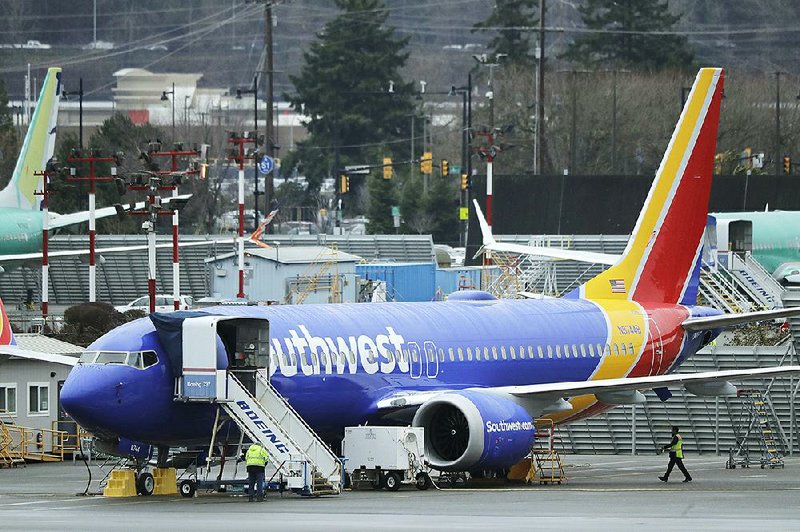A government committee asked to review U.S. approval of new passenger planes after two deadly crashes involving the Boeing 737 Max has found that the system is safe and effective but could be improved, according to a report released Thursday.
The committee differed sharply with legislators who are investigating Boeing and the Federal Aviation Administration, which approved the Max. Key lawmakers have said they may try to stop the FAA from letting Boeing do some inspections and safety analysis on its own planes.
Separately, Southwest Airlines said Thursday that it has taken the grounded Boeing 737 Max out of its schedule until early June and is dropping more than 8% of its planned flights as a result.
Thursday's report came from a committee appointed in April by Transportation Secretary Elaine Chao, after crashes in Indonesia and Ethiopia killed 346 people and led regulators to ground Max jets worldwide.
The committee said the FAA's system of delegating some safety work to aircraft manufacturers is effective and helps the U.S. aerospace industry thrive.
Lee Moak, a former airline pilot and union leader who co-chaired the committee, said members did not look at internal communications in which Boeing employees called the plane a "joke," raised safety alarms about the Max while it was being developed, and admitted concealing problems from regulators.
"It was not the purview of, or charter of, the committee to look at or investigate email traffic," he said.
Last week, leaders of the House Transportation Committee cited those messages and accused Boeing of deceiving regulators. Chairman Peter DeFazio, D-Ore., and Rick Larsen, D-Wash., said they will introduce legislation to strip the company of all or part of its authority to help approve its own aircraft as safe to fly.
Yet the special committee to review the FAA's certification process wrote that the agency's system of delegating work to aircraft manufacturers is "rigorous, robust and overseen by engineers, inspectors, test pilots and managers committed to the primacy of safety."
The committee wrote that it didn't do an investigation, but took a collaborative approach. Its mission was "to collect and analyze information, not find fault."
Asked about possible mistakes in approving the Max, Moak said that was for other groups to investigate.
The committee recommended that the system of delegating inspections to manufacturers should continue, and the FAA and industry should work together to address concerns about "potential undue pressure" on company employees designated to do inspections as planes go through the approval process.
However Moak said the committee found no evidence of pressure on Boeing employees. It also found no reason to dramatically change delegation of inspections.
The report noted criticisms over time, and since the two Max crashes, that giving companies broad authority to oversee themselves creates an "inherent conflict of interest" that results in "a regulatory blind spot."
"This interpretation is inaccurate," the report states. "In fact, with strict FAA oversight, delegation extends the rigor of the FAA certification process" by "multiplying the technical expertise" focused on an aircraft's safety, it said.
"We believe that delegated authority in itself enhances aviation safety as long as it is coupled with proper oversight and with safety management systems," he said, referring to systems in which aviation employees voluntarily report safety concerns without fear of reprisal.
The committee wrote that U.S. commercial aviation is a model of safety and innovation. Since 1996, the U.S. air carrier fatality rate has dropped from 80.9 per 100 million passengers to 0.6 per 100 million in fiscal 2019, the report said.
The report said that aviation experts interviewed by the committee agreed that the FAA's decision to certify the Max as an update to previous generations of 737s rather than a new type of aircraft, didn't affect the Max's safety. Treating the Max as a new aircraft "would not have produced a safer airplane," the committee wrote.
Investigators have implicated new automated flight control software as a factor in the crashes. In each crash, a single faulty sensor caused the system to activate and push down the nose of the plane. Boeing did not tell pilots about the new software until after the Indonesian Lion Air crash, and regulators at the FAA didn't know much about it.
In October, a panel of international aviation regulators found that Boeing changed the design of the software, making it more powerful, without telling the FAA. The panel said that if FAA experts knew more about how the system worked, they likely would have seen that it could overpower pilots' efforts to stop the nose-down pitch.
Southwest Airlines, by taking the Max out of its schedule until June, joined rivals in acknowledging that the plane won't be ready before the start of the peak summer travel season.
Southwest said that without the planes, it will drop about 330 flights each weekday from its normal schedule of about 4,000 daily flights. That is a far higher number of cancellations than at other airlines, which don't own as many Max jets.
Southwest had previously removed the Max from its schedule through April 13. Now it won't use the plane through June 6. American Airlines and United Airlines, the other two U.S. carriers that own Max jets, had already dropped the plane from their plans until June.
Dallas-based Southwest is the world's biggest operator of Boeing 737s, with about 750 in its fleet. It has 34 grounded Max jets -- more than any other carrier -- and expected to get more by now, but Boeing halted deliveries in April, a month after the plane was grounded worldwide.
Information for this article was contributed by Ian Duncan and Michael Laris of The Washington Post.
Business on 01/17/2020
